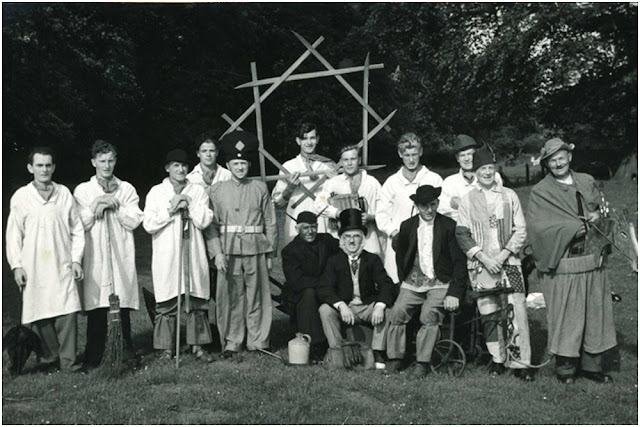Plough Sunday & Monday
 |
| A revival of the Barrow on Humber plough jags as seen in 1953. |
Today is Plough Sunday. A notable first bookmark in the traditional folklore calendar, and an important starting line for the British agricultural year in Lincolnshire. and when ploughmen traditionally returned to the fields to prepare the ground for Spring crops. Plough Sunday held on the first Sunday after Epiphany or Twelfth Night (6th January), Plough Sunday celebrations as you'd expect vary slightly in form going parish to parish, but most usually involve bringing a ploughshare into the Church yard (or even into the Church itself) with prayers then being made, followed by the blessing of the plough and by virtue of this act in turn the land it would work.
In the middle ages, tradition dictated that work in the fields following the 12 days of Christmas would not then resume until the day after Plough Sunday: Plough Monday. But even then, on the Monday communities would hold processions around their village taking the now-blessed plough from door to door. The ploughmen and their brethren, usually in some kind of costume (or with faces blacked with burnt cork or soot as a rudimentary disguise) accompanied by musicians, would sing, dance, generally make merry and the householders would be asked for bread, cheese, ale, or a contribution in money.
In some Lincolnshire towns and villages, these processing plough boys would perform a previously rehearsed Mummers' play. A Mummers play is a type of play / pantomime in which a number of characters are first introduced and then called on stage, two of whom inevitably engage in a mock combat, the loser then being revived by a doctor character. Lincolnshire is in fact notable for the number of villages recorded as having plough play troops. Communities such as Bassingham, North & South Kelsey, Willoughton are mentioned in local accounts as holding plough plays. With The Lincolnshire Archives holding a document from St Mary and the Holy Rood, Donington, in South Holland, dating between the years 1563-1565, which appears to list a number of actors and their respective parts in a plough Play including a Sawbone, Duke, steward, knights, heralds, and messengers, together with a character called Holofernes.
In the sound archives of the British Library, is preserved a recording of folklorist Peter Kennedy interviewing and detailing the memories of farm labourer Richard Brown, who recalls the Barrow on Humber Plough Plays in the 1930s. You can listen to an audio file of this here. In the discussions it's interesting that several times mention is made that in the 20s and 30s the tradition was clearly dying out. With the first world war seeing that many individuals who would have been potential performers being killed in the conflict, and subsequently increasing mechanisation of farming seeing the change from horse drawn plough to tractor reducing the specialist role of plough man.
However with the late 20th C sparking of interest in Folk music and rural traditions some versions of the plays have been revived through the efforts of folk enthusiasts from such groups as Grimsby Morris Men and Coleby Plough Jags. Indeed this year (2022) sees to mark Plough Sunday, two plough plays touring throughout the village of Navenby. One performed by a group of young people from Duck Egg Theatre company touring an updated version of the Bassingham Plough Play. Following the plough with dancing and music as they go. With an adult Plough play team setting off from Mrs Smith cottage and taking their plough Play around the King's Head and the Lion and Royal Pubs.
"


Comments
Post a Comment